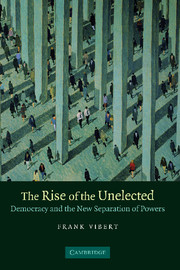Book contents
- Frontmatter
- Contents
- List of boxes, tables and figures
- Acknowledgements
- Introduction
- 1 The world of the unelected
- 2 The driving forces
- 3 The advantages of the new separation of powers
- 4 The challenge to conventional democratic theory
- 5 Adapting traditional approaches
- 6 The new separation of powers and the advent of the informed citizen
- 7 Informed citizens and the changing role of traditional institutions
- 8 The legitimacy of the new branch
- 9 The new separation of powers and the European Union
- 10 International institutions: blurring the boundaries
- 11 Conclusions: the accountability of the new branch
- Appendix: List of unelected bodies referred to in the text
- Bibliography
- Index
7 - Informed citizens and the changing role of traditional institutions
Published online by Cambridge University Press: 22 September 2009
- Frontmatter
- Contents
- List of boxes, tables and figures
- Acknowledgements
- Introduction
- 1 The world of the unelected
- 2 The driving forces
- 3 The advantages of the new separation of powers
- 4 The challenge to conventional democratic theory
- 5 Adapting traditional approaches
- 6 The new separation of powers and the advent of the informed citizen
- 7 Informed citizens and the changing role of traditional institutions
- 8 The legitimacy of the new branch
- 9 The new separation of powers and the European Union
- 10 International institutions: blurring the boundaries
- 11 Conclusions: the accountability of the new branch
- Appendix: List of unelected bodies referred to in the text
- Bibliography
- Index
Summary
The key to seeing what the advent of informed citizens and the new separation of powers means for the traditional institutions lies in distinguishing between two roles. One role that traditional institutions can play is that of problem-solving. The other role is of providing an arena for the discussion of values and principles. When a government sets out its role as problem-solver it asks people to believe that it has the answers to questions such as how to provide comfortable retirement for ageing populations, or the answer to providing better healthcare or education. When assemblies provide an arena for discussion of values and principles, it is such terms as ‘solidarity’ or the ‘social market’ or ‘family values’, or ‘the precautionary principle’ or ‘ethical’ foreign policies, that colour the discussion.
Very often the discussion of values is thoroughly entwined with particular approaches to problem-solving. European politicians often talk about the ‘social partners’ or the ‘social market’ in the context of problem-solving, for example when talking about labour market reforms. When they do this, they are linking their approach to a particular problem to background values about the nature of the market, when it is justified for governments to intervene and how that intervention should be orchestrated. Similarly, when they talk about ‘sustainable development’ the aim is to link economic policy-making with environmental values.
- Type
- Chapter
- Information
- The Rise of the UnelectedDemocracy and the New Separation of Powers, pp. 101 - 113Publisher: Cambridge University PressPrint publication year: 2007



